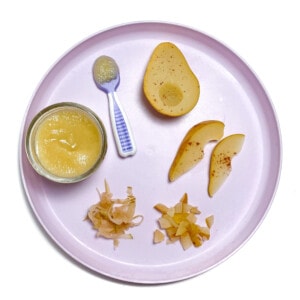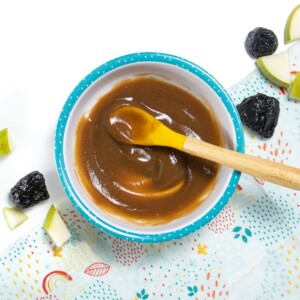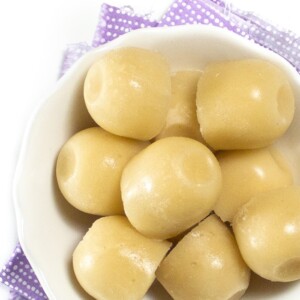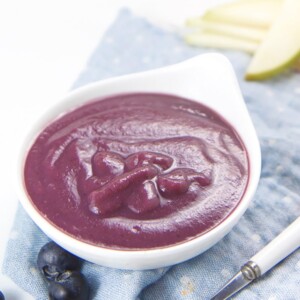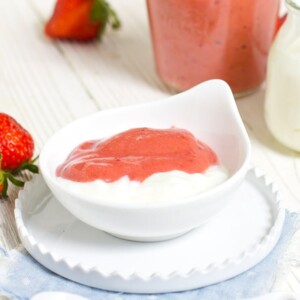Pear Profile
Medically reviewed and cowritten by Jamie Johnson, Registered Dietitian Nutritionist (RDN).
Pears for Baby
Not only are pears super tasty, but they are also a great source of fiber and vitamin C, and they contain vitamin K and potassium. These important nutrients are vital for a healthy heart, bones, immune system, and digestive tract! Many practitioners even recommend pears as one of the first fruits introduced to babies since they’re easy on under-developed digestive tracts. When grabbing a pear to snack on, think twice before peeling. A pear’s skin contains three to four times as many antioxidants as the flesh and have anti-inflammatory and anti-cancer properties! The thin skin, which has good flavor, also contains more than half of the pear’s dietary fiber. Add pears to a smoothie for a nutrient boost, or puree them with apples for a delicious take on apple sauce for kiddos and your baby.
HEALTH BENEFITS OF PEARS
There are tons of varieties of pears, and all are nutritious, so offer different types to give your baby different tastes and textures.
- Good source of immune-boosting vitamin C.
- Great source of fiber, to help with digestion and improves constipation.
- Provide vitamin K to help strengthen bones.
Highlighted Nutritional Importance
Vitamins
Vitamin C – strengthens blood vessels and helps to minimize bruising from falls and scrapes.
Vitamin K – vital for the blood clotting process and bone health.
Vitamin B2 – important for baby’s muscle and bone health and helps to promote growth and good vision.
Minerals
Copper – helps to form collagen which is essential for healthy bones and connective tissue
Potassium – works with sodium to help control water balance in the body and helps to maintain a healthy blood pressure
Magnesium – this mineral is essential for maintaining a steady heart rhythm and strong bones
Pears are a Hypoallergenic Food
Healthcare practitioners are excited about pears and their potential hypoallergenic (low allergy) properties. People often eat pears when following a low-allergy diet plan, and many individuals report having fewer allergy-related symptoms when consuming pears versus other fruits. Since pears have better digestibility than other fruits and seem to have a decreased allergic response, it’s easy to see why they are a great choice for your baby!
How to Select and Store Pears for Baby Food
Pears are not listed on the Dirty Dozen list, meaning they aren’t at risk of being heavily contaminated with fertilizers and harmful pesticides. Buying organic is a personal choice.
When shopping for pears at the farmers market or grocery store, look for pears that are slightly ripe but not overly squishy by gently pressing the top of the pear by the stem. If that spot gives in to pressure, the pear is probably optimally ripe for eating. The pear should have smooth skin free of bruises or mold and free of punctures or dark, soft spots. If you notice that some pears are multi-colored and have brown-speckled patches, the pear may have a more intense, delicious flavor! Since pears are very perishable when ripe, you will probably find most grocery store pears unripened and hard. To speed up the ripening process, place the unripened pears in a paper bag and keep them at room temperature.
Fresh pears are delicious and eaten as-is and are perfectly cut into pieces for toddlers and babies. Since they tend to oxidize and go brown very quickly, you can squeeze a few drops of fresh citrus juice to preserve their color and taste. Pears are also perfect for puree for your baby and can even be added to baked goods, like muffins or breads, for a tasty nutrient boost.

